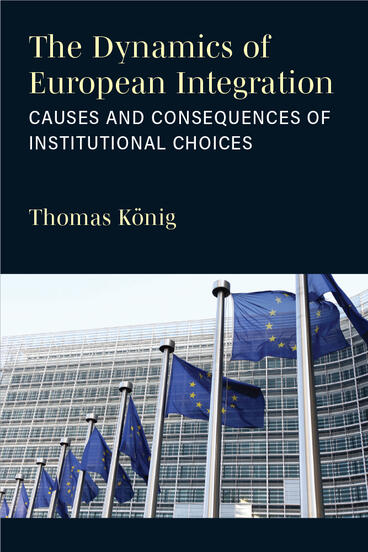The Dynamics of European Integration
Causes and Consequences of Institutional Choices
Examines how certain policy models can work within the context of dissensus and polarization in Europe while still promoting solidarity and trust in the European Union
Description
In Europe’s recent history, there have been several challenges to the strength of the European Union—Brexit, COVID, financial crises, and global tensions—bringing an increased need to understand the ways that the European Union (EU) could successfully stay together or fall apart. In examining how the European Union has changed since 1993, important puzzles have emerged, including how national government functions are transferred to the EU without reforming the EU, how increased transparency is announced while decisions are approved in informal meetings, and how the effects of the polarizing rise of Euroscepticism can be managed to still promote the formation of solidarity and trust among Europeans. To understand these puzzles, Thomas König introduces a new theory of (supra)national partyism to help explain the causes and consequences of choices made by political leaders for Europe. He uses a game-theoretical perspective to look at how conditions for leaders change through accessions of new members, shocks, and crises, and separates institutional choices into two different games played by office- and policy-seeking political leaders—the interstate summit game and the national game of party competition. The Dynamics of European Integration reveals how the reorganization of electoral systems can harness dissensus and polarization among diverse national constituencies to enable the promotion of solidarity and trust in the EU.
Thomas König is Professor of Political Science and European Politics at the University of Mannheim.
Reviews
“Thomas König’s ‘partyism’ makes a major contribution to the study of European integration. It offers a comprehensive model and rich empirical analysis of the development of the European Union since the early 1990s. This impressive synthesis is sure to shape our understanding and theorizing of European politics and governance.”
- Frank Schimmelfennig, ETH Zurich
“This is a fundamental book. König focuses on the actors that operate (face constraints, receive payoffs and interact) in both national and European systems: the (supra)national parties. He derives propositions on both causes and consequences of these actors’ choices and uses large datasets to corroborate his expectations. A remarkable achievement.”
- George Tsebelis, University of Michigan
“Thomas König has set out and tested a completely new explanation of European integration, where the central actors are political parties rather than national governments or the supranational institutions. The theoretical ideas and the empirical tests are based on several decades of research and careful thinking by Thomas and his colleagues. The result is the most important book on European integration since Moravcsik’s The Choice for Europe in 1988.”
- Simon Hix, European University Institute
“Professor Thomas König’s book is an extremely important and a well-timed attempt to explain how the EU has changed in recent decades. Its insights provide valuable grist for the mill for scholars, practitioners, and politicians alike interested in making sense of how the EU has managed sets of crises and what it all means for the future of the European project.”
- Catherine E. De Vries, Generali Chair in European Policies and Professor of Political Science at Bocconi University in Milan

